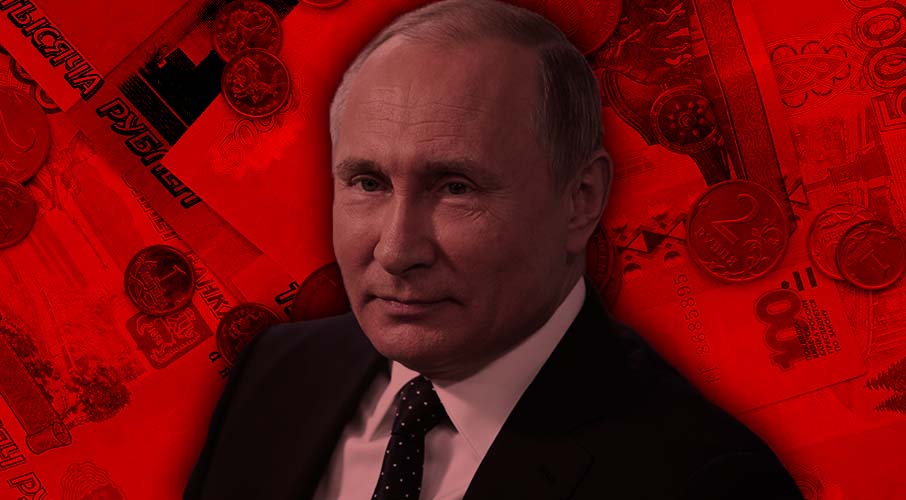 Sanctions are by no means the only tool to combat Russian aggression, but they represent a targeted tactic that hits the regime where it’s most vulnerable. Sanctions should therefore be central to our strategy to combat Moscow’s belligerence, write Marcus Kolga and Bill Browder.
Sanctions are by no means the only tool to combat Russian aggression, but they represent a targeted tactic that hits the regime where it’s most vulnerable. Sanctions should therefore be central to our strategy to combat Moscow’s belligerence, write Marcus Kolga and Bill Browder.
By Marcus Kolga and Bill Browder, January 17, 2022
This article is part of the Toronto Star’s Saturday Debate series.
As Vladimir Putin amasses over 100,000 troops and legions of tanks, missiles, and ships along Russia’s border with Ukraine, the democratic world cannot afford to hesitate and must take immediate measures to stop him.
Despite what Vladimir Putin has wildly alleged, the West has never sought confrontation with Russia, nor do we pose any threat to its sovereignty. Yet Putin has repeatedly created one crisis and conflict after another — stepping over “red lines” in Syria, invading Georgia and Ukraine, interfering in Western elections and has tested the resilience of our alliances with impunity.
But we have a weapon at our disposal that can quickly and precisely induce Putin to adjust his calculus by imposing a targeted and personal cost to him: sanctions. Specifically, sanctions that target the Russian president’s personal wealth and the kleptocrats who enable him.
We know that sanctions work based on Putin’s own reaction to them. When Canada adopted the Sergei Magnitsky Law, which empowers Canada’s government to impose targeted sanctions on foreign officials who engage in corruption and human rights abuses, Putin lashed out and accused Canada of engaging in “unconstructive political games.”
Natalya Veselnitskaya, the same Kremlin lawyer who organized the infamous Trump Tower meeting ahead of the 2016 U.S. presidential elections, also took aim at the Canadian Magnitsky campaign.
Over the past weeks, the threat of new Western sanctions has been raised in response to Russian military aggression against Ukraine. This has caused Putin to warn the U.S. of “a complete rupture of relations” if new sanctions are imposed against his regime. Putin’s reflexive response demonstrates the effectiveness of sanctions and the threat they represent to Putin’s personal wealth and his power.
Putin’s greatest ambition has been to accumulate wealth and consolidate his power to protect it. He and his kleptocrats have amassed wealth through theft, extortion and outright embezzlement. As head of state, Putin has abused his power to accumulate at least $200 billion and possibly much more. Russian opposition activist, Vladimir Kara-Murza recently wrote that “private Russian assets stashed abroad are estimated to exceed $1 trillion” with much of it linked to Putin and the oligarchs who enable him. Some would argue that he’s the richest man in the world; richer than Bill Gates, Jeff Bezos and Elon Musk.
Putin doesn’t keep the money and assets he’s stolen in his own name. He understands that anyone with a bank statement or property record could then blackmail him — and he has certainly used that tactic on his enemies before.
To protect his wealth, Putin holds his money in the names of famous Russian oligarchs. Greed and wealth are Putin’s Achilles heel, and represent our best opportunity to disrupt his ambition for conflict. At the same time as he’s threatening military intervention in Ukraine, his money is very much exposed in the West. We can send a powerful message to Putin by going after the assets of his oligarchs abroad.
This isn’t theoretical. After Putin was caught hacking the 2016 U.S. presidential election, Congress passed the Countering America’s Adversaries Through Sanctions Act and in April 2018, imposed sanctions on several Putin-linked oligarchs and companies owned by them. The announcement went off like a neutron bomb over Moscow and deterred a repeat of Kremlin interference in the 2020 U.S. elections.
Evidence that Canada is being used as a safe-haven by Russian oligarchs to stash their money is well documented and publicly available. Freezing Canadian assets of Putin’s closest oligarchs represents an opportunity for Ottawa to take global leadership and develop a credible cost and highly targeted deterrent against the Kremlin’s aggression.
By blocking the ability of oligarchs to access their assets and barring their financial interactions with the West, Putin’s own wealth is exposed and his ability to protect the oligarchs who enable him is compromised.
Sanctions are by no means the only tool to combat Russian aggression, but they represent a targeted tactic that hits the regime where it’s most vulnerable. Sanctions should therefore be central to our strategy to combat Moscow’s belligerence.
Rhetoric, empty threats and “red lines” will not curb Vladimir Putin’s appetite for crisis and conflict. He’s made it very clear that Western sanctions represent a significant threat to his regime. We should not hesitate to strengthen our deterrent against the Kremlin by targeting his assets and those of the kleptocrats who support him.
Marcus Kolga is a senior fellow at the Macdonald-Laurier Institute and founder of DisinfoWatch.org. Bill Browder is the founder and CEO of Hermitage Capital Management and was the largest foreign investor in Russia until 2005. Since 2009, when his lawyer, Sergei Magnitsky, died in prison after uncovering a $230 million fraud committed by Russian government officials, Browder has been leading a campaign to expose Russia’s endemic corruption and human rights abuses.




